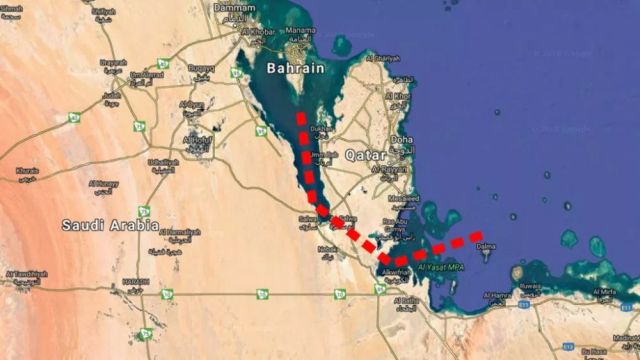
by admin | May 25, 2021 | Muslim World
 By Haider Abbas
By Haider Abbas
There seem to be more and more trouble brewing in the Middle-East, apart from the spread of COVID-19 pandemic , as the latest bombshell to come is from Qatar defense minister Khalid Al Attiyah who has claimed that Kingdom of Saudi Arabia (KSA) with UAE and Bahrain, the last two have just embraced Israel to start with their full-diplomatic relations on August 14, 2020 and September 10, 2020, after Beirut blasts of August 4, 2020, were planning to ‘occupy’ Qatar in a two-phased plan! According to a report published in Middle East Eye.
‘There was a premeditated intention for an invasion, not just a siege. This plan was set into two phases, imposing the siege with the aim of creating an overall state of panic, which would have a direct impact on the Qatari street, then executing a military invasion,” the minister said. They wanted to implement the siege phase fully then to invade, things were clear to us all the intelligence we had and all the available evidence undoubtedly confirmed the theory of an existing plan. Since 2017, Saudi Arabia, Bahrain and the UAE have imposed a blockade on Qatar. The Saudi-led coalition said it launched the blockade against Doha in a bid to stem Qatar’s alleged support of terrorism in the region – a charge that Qatar has denied. The designs hadn’t been new as in 2017 former US defense secretary of state Rex Tillerson is said to have prevented Qatar invasion by KSA forces is support with military aid from UAE reported Al Jazeera .
Qatar had already been reeling under economic blockade by KSA, since 2017, with its business, air-traffic, economy, food and supplies compromised, which was a ploy to trigger massive public unrest against its royal-family, and then later to pounce militarily on it, was the KSA double-edged plan, but all that could not happen. KSA standard alibi was that Qatar is friend with Hamas and Muslim Brotherhood, according to Times of Israel and therefore ought to change its policies, or else stringent measures were coming, which was to annex Qatar and who knows, as Arab states were soon to open-up-gates for Israel, an Israeli military base in UAE and a KSA-UAE-Bahrain-Israel invasion of Qatar was to be the understood fait accompli! But, be sure that the plan hasn’t been shelved.
Qatar is battling the KSA embargo and now all imports from Turkey have also been banned by KSA, as reported by English.Alaraby.Co,UK and ironically both are under the wrath of KSA, but Turkey, which is raring to reclaim its Ottoman Caliphate, after about 100 years, considers Qatar to be its original vicegerent, since the Ottoman empire/Caliphate was abrogated by the Britishers after the first-world-war, and quite understandably, when Turkey Lira was in a downslide it was Qatar which came to rescue with 15 billion USD amidst the US standoff as was reported by CNBC on August 15, 2018 and after the outbreak of COVID-19 Qatar has again bailed-out Turkey with 15 billion USD more investments, reported Bloomberg . Qatar has very strong relations with Iran, Russia and with US as well. One of the biggest US military base is in Al Udeid, Qatar which served as a launch pad for US drones and bombers to hit in Afghanistan, but slowly Qatar started to change-its-policies and provided for venue for the Afghan-Taliban and US & Afghanistan government for the dialogues in Doha, which ultimately laid way for US to finally move out of Afghanistan after its 19 years disastrous war. Qatar’s news channel Al Jazeera just cannot be credited less, for its role, has been that of a fulcrum to iron-out-things between the contestants in Afghanistan. No wonder, Qatar is also an ardent votary of its reclaim to its parent Ottoman empire, which may be the prime reason, that compelled KSA, UAE and Bahrain to make a final bid over Qatar, as all the Arab states were cut out of the Turkish Ottoman empire along with Israel which was a part of Turkish Palestine.
With the fast pace changing world scenario, any KSA move (with an understood Israel support), which has now been blown, would invite Russian interference in Qatar in alignment with Iran & China as China and KSA relations have also been dipped. US has also now officially supported India over its conflict with China on the question of Arunachal Pradesh, which has made Israel and KSA also aligned with India, while China is now trying to engage more effectively with Turkey and Qatar and seek to import its oil and gas from Qatar. KSA has slid to third position in terms of its oil imports to China which has very hardly stuck KSA economy. China has now decided to likely include Qatar in its Belt and Road Initiative, came the report from The Penninsula Qatar .
Qatar did get its its biggest impetus when it got the status to host the football FIFA world-cup-2022, which KSA wanted to be stripped, reported Times of Israel and wanted England or US to host it instead, but now KSA’s own economy is in doldrums and its ‘Vision 2030’ is far to be seen as a success, but instead Qatar has smartly launched many lucrative steps, like its easiest Visa rules which is available in exchange of a few dollars, and its airlines has become the number one airlines in the world, informed WorldAirlineAwards.com for the fifth year in a row. Qatar also knows it very soon that oil is also to exhaust and hence has switched to organising gala events like World Cup to bolster its tourism industry. The news, of KSA invasion, might have to an extent stopped KSA steps, but for sure KSA annexation-plan of Qatar and Israel annexation-plan of West Bank in Palestine stems from the same expansionist agenda and will therefore remain on table!
The writer is a former State Information Commissioner. He is a media analyst and writes on international politics.
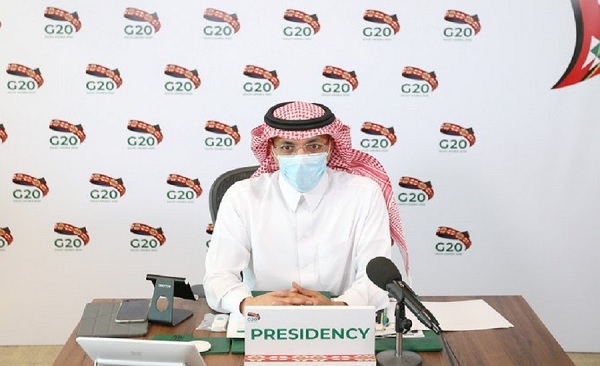
by admin | May 25, 2021 | Muslim World

Saudi Minister of Finance Mohammed Al-Jadaan attends a virtual meeting of G20 finance ministers and central bank governors in Riyadh on July 18, 2020.
Ghazanfar Ali Khan
RIYADH – The G20 under the current presidency of Saudi Arabia will consider extending a debt payments suspension program for the poorest countries as financial policymakers from the world’s biggest economies continue to take “exceptional measures” to support debt-ridden nations and expedite global economic recovery. This was announced here on July 18 following a virtual meeting of the G20 finance ministers and central bank governors.
Saudi Arabia’s finance minister Mohammed Al Jadaan and the Kingdom’s central bank governor Ahmed Al Kholifey chaired the virtual meeting. Saudi Arabia has taken a global leadership role in combating Covid-19 pandemic and it stands firmly in unison with the international community, especially with the G20 member states, to deal with this international crisis, said a report released on this occasion.
Al-Jaadan said: “The world is still living through Covid-19 and there is a lot of uncertainty around, but I am optimistic as always. Saudi has weathered an even worse oil crisis in the past and worse geopolitical situation in the past and …we recovered strongly, as this is not going to be an exception… We are watching what’s happening in the world,” Al Jadaan said, highlighting that the G20 group is prioritizing its efforts to support the global economic recovery.
Referring to the Debt Service Suspension Initiative (DSSI), a joint communique released by the G20 after the meeting, he said: “We will consider a possible extension of the DSSI in the second half of 2020, taking into account the development of the Covid-19 pandemic situation.” The G20 group has made progress on the DSSI, which runs until the end of 2020. A total of 42 countries have requested support so far under the scheme, amounting to the deferral of an estimated $5.3 billion in debt repayments, the group said.
The International Monetary Fund (IMF) and the World Bank Group will send a report to the G20 in October explaining the financial conditions of the countries eligible for debt relief. There is, however, a need for “further progress and [the G20] strongly encourages private creditors to participate in the DSSI on comparable terms when requested by eligible countries”, the communique added. It is important to note here that the G20 member states agreed in April this year to a time-bound suspension of debt service to deal with the Covid-19 pandemic.
The statement further said: “We are determined to continue to use all available policy tools to safeguard people’s lives, jobs and incomes, support global economic recovery, and enhance the resilience of the financial system, while safeguarding against downside risks.” Referring to the concerns raised by the World Bank that China, a member state of G20 and the largest creditor, was not participating fully, the G20 officials urged all bilateral creditors to implement the DSSI fully and honestly.
Saudi Arabia has already pledged $500 million to support global efforts to combat the pandemic. It has and urged other nations and organizations to help bridge an $8 billion financing gap. The Kingdom will also be providing SR10 million to help the Palestinians in the West Bank and Gaza Strip combat the coronavirus, according to an initiative by the King Salman Humanitarian Aid and Relief Center (KSrelief). On the institutional level, the Kingdom is collaborating with various local and international organizations to contain the spread of this disease. Saudi Arabia has provided $10 million to the World Health Organization (WHO) as part of its efforts to combat the novel coronavirus.
Meanwhile, Saudi Arabia’s Social Development Fund (SDB) has announced a package of more than $2.4 billion to help micro-enterprises and small businesses. The Saudi leadership has also taken care of its huge expatriate population, whose number exceeds 11 million including 2.7 million Indians living and working in Saudi Arabia. All expatriate workers have free access to the Kingdom’s health facilities for the treatment of coronavirus. They have also been exempted from paying a levy for renewal of their residence permits for several months.
All these measures and the generous allocations for funds have been commended by the international community, global organizations, and regional agencies. The Foreign Ministers of the Organization of Islamic Cooperation (OIC) member states hailed the efforts made by the Kingdom. On its part, the World Health Organization (WHO) praised Saudi Arabia for the financial aid it has granted to help international fight against the pandemic. Dr. Tedros Adhanom Ghebreyesus, WHO Director-General, expressed his appreciations for King Salman for his contribution of $500 million to support the world in its battle against Covid-19.
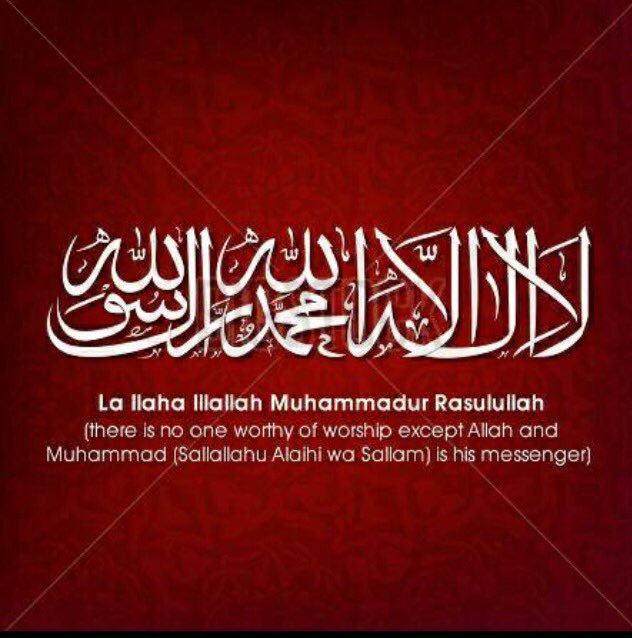
by admin | May 25, 2021 | Muslim World, News

Riyadh: The Kingdom of Saudi Arabia and its people will celebrate on Monday, September 23, as every year, the Saudi National Day commemorating the reunification of the country by the founding King Abdulaziz Bin Abdulrahman Al-Saud.
The historic day on which King Abdulaziz Bin Abdulrahman Al-Saud declared the unification of the country on the 19th of the month of Jumada 1 of 1351 AH (September 23, 1932 AD) Under the banner of ” There is no God but Allah and Muhammad is the Messenger of Allah.” Peace be upon him laid down the rules of this structure on the basis of the Holy Book (Qur’an) and the Sunnah of His Messenger – peace be upon him – following the footsteps of his predecessors from the House of Saud, on a solid foundation building a Kingdom, its area, covers more than 2,250,000 square kilometers.
The Kingdom has been developing for decades and has become a model of unity, stability, security, and prosperity, the Saudi press agency SPA reported. It’s noteworthy that the Kingdom now is a leader and plays a leadership role regionally and internationally in the political, economic, security, and social spheres.
The celebrations of the Saudi National Day usually includes a series of entertainment shows in the Kingdom, highlighting the achievements of the country, the same source added.
The Events include concerts, plays, cultural and sports performances, folklore dances, laser shows, hot air balloon demonstrations, and more.
These events are being held in Riyadh, Jeddah, Dammam, Hail, Tabuk, and several other cities and are experiencing a record influx of young Saudi men and women who see it as an opportunity to show their patriotism and love for the nation.
SM/UNA-UNA
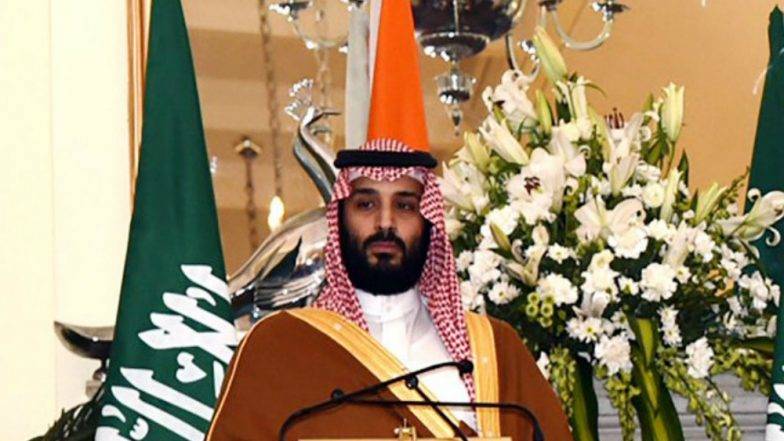
by admin | May 25, 2021 | Business, Opinions
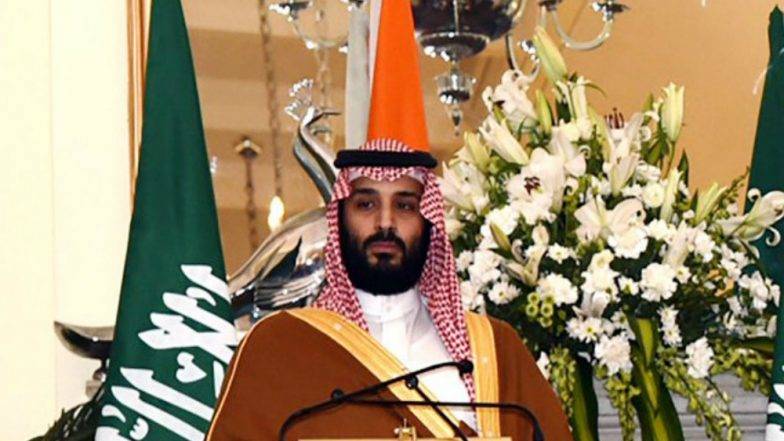
By Dr. Cauvery Ganapathy
Indias relations with Saudi Arabia since 2006 is an example of a dynamic that has enmeshed diversified strategic orientations successfully. While strengthening historical sinews, New Delhis ties with Riyadh over the years, has been unaffected by Indias strident forays into new partnerships in West Asia.
Simultaneously, the relation has also evolved over time into a diversified portfolio that subsumes a far wider range of issues than energy and diaspora issues alone. Home to a 2.7 million strong Indian diaspora, as India’s fourth largest trading partner and consistent as one among its three largest suppliers of oil , Saudi Arabia’s relevance to the Indian economy is indisputable.
This is, however, an old tale. What Crown Prince Mohammed bin Salman’s visit, it was hoped, would consolidate was a more recent role as a strategic partner. Much in the visit touched upon that hope. In addition to the creation of a Strategic Partnership Council, Memorandums to facilitate cooperation between the two sides were signed on a diverse range of concerns such as-
– The National Investment and Infrastructure Fund
– Tourism
– Housing
– Closer coordination through bilateral investment forums, and
– Broadcasting
Proclamations from MBS – as the Crown Prince is popularly known – alluding to an investment of nearly $200 billion in India over the next two years was also seen as a significant indication of Riyadh’s keenness in cultivating ties with New Delhi. Coupled with the general bonhomie and optimism that persisted, MBS’ visit does qualify as a successful bilateral meet.
However, it may be worthwhile to consider if the intrinsic value of the partnership could not, in fact, have been leveraged a bit more through themes such as:
Price Stabilisation -This would insulate India from the obvious and expected volatility of the energy markets. India offers an assured market for the mainstay of Saudi Arabia’s export basket and an agreement that would ensure price stabilisation for the commodity could, therefore, prove profitable to both the parties.
Abolition of the Asian Premium – The substantial volume of crude oil purchased by India translates into an import bill that is inflated. Removal of such a ‘premium’ would aid in reducing India’s import bill.
Allowing India a buy-in as a ‘cornerstone investor’ into ARAMCO, if and when it is launched, would signal a long-term commitment on part of both the States to strengthening of ties.
Enhanced defence cooperation between the two countries would not only prove beneficial but given regional realities, it would perhaps, prove more effective and binding to forge an institutional mechanism that could propel such a partnership forward.
Finally, there are two factors that New Delhi would perhaps do well to consider in cultivating the relations with the Saudis further-
– To express chagrin and seek to publicly push others to choose India over another country, however justified our own outrage, is not perhaps a very fruitful expression of diplomacy or international politics. It would bode us better to strengthen the invested stake of a country like Saudi Arabia in our own welfare by making the economic and strategic ties too robust to override in times of localized or international conflict; and an integration of economic and security interests does this better than well-meaning but hyperbolic expressions of expectations in the media.
– Indian energy diplomacy has long been plagued by a belated undertaking of due diligence back home before the concluding of agreements with foreign countries. The fact that the massive Saudi investment in Ratnagiri, Maharashtra is now caught in the crosshairs of local politics and land acquisition issues, is just one more example of this tendency. It is true that countries are always appreciative of and seek out lucrative and large markets such as India. That does not, however, imply that sovereign wealth-fund owners such as Saudi Arabia would carry an unending reservoir of patience regarding commitments coming to fruition.
(IANS)

by admin | May 25, 2021 | Muslim World
 Baghdad : Iraqi Prime Minister Adel Abdul Mahdi on Wednesday held a phone call with Saudi King Salman bin Abdulaziz Al Saud over means to promote bilateral ties and cooperation in various fields, Abdul Mahdi’s office said.
Baghdad : Iraqi Prime Minister Adel Abdul Mahdi on Wednesday held a phone call with Saudi King Salman bin Abdulaziz Al Saud over means to promote bilateral ties and cooperation in various fields, Abdul Mahdi’s office said.
The office said in a statement that Abdul Mahdi received a telephone call from Saudi king in which he discussed “expanding relations of cooperation between the two countries in all fields and enhance chances of security and stability in the (Middle East) region.”
Abdul Mahdi also said that he is looking forward to more cooperation in trade and oil fields, and a relation of partnership that serves the two peoples and bolsters stability and security of the region, the statement added.
The Saudi king reaffirmed Saudi Arabia’s support to Iraq and its keenness for Iraq’s stability and prosperity, the statement said, according to Xinhua news agency.
Relations between Iraq and Saudi Arabia improved in 2016 when Saudi reopened its embassy in Baghdad after Iraq’s invasion of its neighbouring Kuwait in August 1990.
On February 25, 2017, Saudi Minister of State for Foreign Affairs Adel al-Jubeir visited Iraq, the first for a Saudi foreign minister since 1990.
Bilateral relations have improved immensely as both countries have close historical, linguistic, cultural and geographic ties as well as their willingness for potential future cooperation.
—IANS






